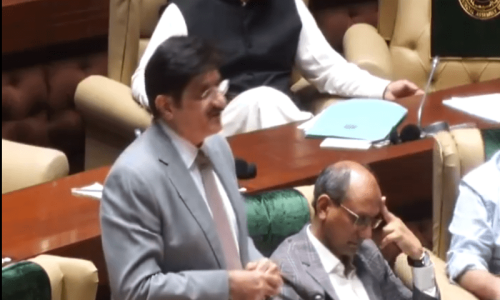KARACHI: Day two of the Fourth International Karachi Conference being organised by the Karachi Conference Foundation at the National Museum auditorium here on Saturday looked back at the city’s past, the forgotten moments in Karachi’s history.
In her welcome address, Dr Asma Ibrahim, director of the Museum and Art Gallery, State Bank of Pakistan, and founder president of Karachi Conference Foundation, said the biggest problem of Karachi was its citizens’ not owning this city. “So the Karachi conference provides us with a forum for discussing the issues of Karachi,” she said, adding that “we are also learning through our conferences and the topics discussed here are then also taken to the departments concerned.”
This year’s conference focuses on the critical issues of the city, the problems faced by the citizens of Karachi in the face of urbanisation, while zeroing in on the heritage and environment of this city and how it is being affected by the urban growth.
The keynote address by Dr Sarah Ansari, professor of history at Royal Holloway, University of London, was about ‘Reconstructing the city, contesting the past: forgotten moments in Karachi’s history’.
Turning the spotlight on the important moments in history that have slipped from the memory of most people, she spoke about how Karachi made space for people coming in from India as a new country came into being here. “Karachi like other cities of the world also has complex layers of urban biography. Sometimes the history of a place includes seismic events such as earthquakes. The year 1947 represents one such seismic activity in history of Karachi when it became ground zero for so many people who came here to make it their home,” she said before going back even further in time when this city was one of British India’s major ports.
“But history didn’t start for Karachi in 1947,” she said while reminding how Karachi opened up for business and transformed over the years through developments in transport and communications. Against the backdrop of Karachi’s multiplying connections, she spoke of how this city became a place where people travelled to from far for various reasons chief among which was trade and politics.
In 1921, it was a place for united public expression as well. Karachi’s Khaliqdina Hall was where the historic trial of the leading figures of the Khilafat Movement, the Ali brothers, took place. More reasons of bringing people to Karachi included the coming here of the Haj pilgrims to go on to Makkah through the sea route. Mahatma Gandhi also arrived here in 1931 for the Karachi session of the Congress in which the Gandhi-Irwin Pact, a resolution to dissociate itself from and disapprove of the political violence following the execution of Bhagat Singh, Sukhdev and Rajguru was endorsed. The All India Women’s Conference also took place in Karachi in 1935. Karachi also served as the venue for the first Sindh provincial Muslim League Conference in 1938. The city’s role as a strategic spot during the two years before the birth of Pakistan when Royal Air Force troops stationed at Mauripur travelled to Africa and Mediterranean from Karachi.
More on Karachi followed in the session on ‘Urbanisation trends in Karachi’, where architect and town planner Arif Hasan delved into the nature and scale of rural-urban migration and the physical and location changes in informal settlements in view of the formal planning and location of new middle and high income ones, and the impact of these developments on the ecology of the region in which Karachi is located while comparing them with similar changes in other South Asian megacities.
Researcher and writer Fahim Zaman, meanwhile, examined the geospatial overview of the urbanisation trends, in the first session focusing on the same, which was chaired by Dr Nausheen Anwar of the Institute of Business Administration.
The ‘Azkaar-i-Karachi’ session, presided over by historian Dr Kaleemullah Lashari, included paper presentations by research authors Akhtar Balouch, Gul Hasan Kalmati and Aslam Khwaja. More papers by researchers, explorers and sociologists Donna Fernandes, Ameem Lutfi, Adeem Suhail and Dr Hafeez Jamali were presented in session number three on ‘Memory, tradition and community’, which was chaired by researcher, artist and author Rumana Husain.
The evening programme included folk music performances featuring artists from Karachi, Thar and other locales in Sindh.
The conference concludes on Sunday.
Published in Dawn December 11th, 2016













































Dear visitor, the comments section is undergoing an overhaul and will return soon.